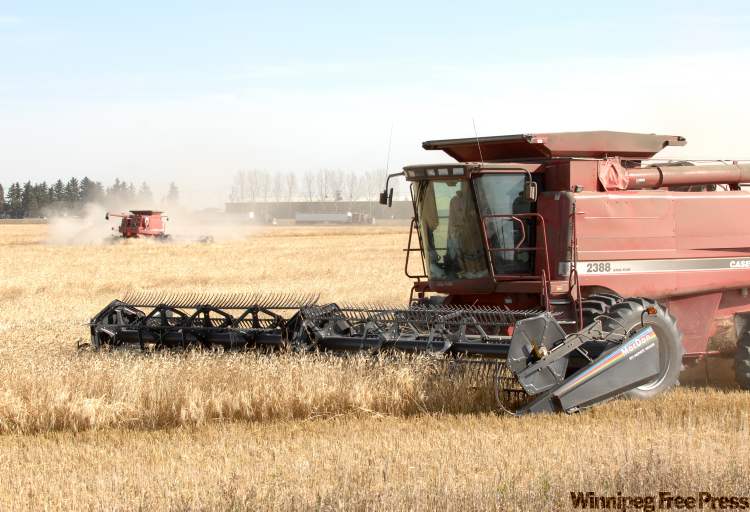Open-market trading by January?
Tories hope to pass legislation this fall
Advertisement
Read this article for free:
or
Already have an account? Log in here »
To continue reading, please subscribe:
Monthly Digital Subscription
$1 per week for 24 weeks*
- Enjoy unlimited reading on winnipegfreepress.com
- Read the E-Edition, our digital replica newspaper
- Access News Break, our award-winning app
- Play interactive puzzles
*Billed as $4.00 plus GST every four weeks. After 24 weeks, price increases to the regular rate of $19.00 plus GST every four weeks. Offer available to new and qualified returning subscribers only. Cancel any time.
Monthly Digital Subscription
$4.75/week*
- Enjoy unlimited reading on winnipegfreepress.com
- Read the E-Edition, our digital replica newspaper
- Access News Break, our award-winning app
- Play interactive puzzles
*Billed as $19 plus GST every four weeks. Cancel any time.
To continue reading, please subscribe:
Add Winnipeg Free Press access to your Brandon Sun subscription for only
$1 for the first 4 weeks*
*$1 will be added to your next bill. After your 4 weeks access is complete your rate will increase by $0.00 a X percent off the regular rate.
Read unlimited articles for free today:
or
Already have an account? Log in here »
Hey there, time traveller!
This article was published 01/10/2011 (5094 days ago), so information in it may no longer be current.
OPEN-market trading of Prairie wheat and barley could begin as early as January, a senior federal official told a Winnipeg agriculture industry audience Friday.
But just what mechanisms will be in place by then to allow that to operate — as well as every other component of the supply chain — remains in question.
Greg Meredith, assistant deputy minister of Agriculture and Agri-Food Canada, told about 200 industry participants at a University of Manitoba Transport Institute conference in Winnipeg the federal government is determined to introduce and pass legislation that will end the Canadian Wheat Board’s single-desk monopoly this fall.

“There is a need for certainty and clarity,” he said.
But industry and academic speakers at the day-long conference effectively said that regardless of which side of the issue one happens to be on, there is almost no getting around the fact there will be plenty of uncertainty.
Doug Hilderman, senior wheat buyer for ADM Canada — the CWB’s largest customer — said he needs to know he will be able to buy wheat in January.
If the legislation passes and the bill receives royal assent, there will be nothing stopping that from happening.
But even Meredith noted, “Doing that between now and December will be a challenge.”
ADM has several flour mills across the country, including one in Point Douglas, and needs to keep supplying those mills.
“We are different than almost anybody else,” Hilderman said. “We have factories. We can’t ever stop buying wheat. If this transition period is not properly laid out and quickly, it will be a potential problem for us.”
ICE Futures Canada (formerly Winnipeg Commodity Exchange) is completing a proposed spring wheat and durum futures contract based on its successful canola futures contract.
Brad Vannan, CEO of the electronic futures market, said once it gets regulatory approval, the contracts can begin trading as soon as royal assent is granted. In the meantime, Vannan said, “Regardless of any barriers or anomalies that may occur, the market will continue.”
The CWB normally would book sales as far as eight months out, but Hilderman said it has already told him it will not be in a position to do that come January.
He said ADM has had discussions with grain-handling companies like Cargill, Viterra and Richardson International and he gets mixed messages from them about how the market will function in the early post-CWB days.
“Some say it will be fine, others say it will be unclear how it will work for them,” Hilderman said.
Mark Hemmes, president of Quorum Corp., the Edmonton-based consulting firm that has been monitoring the Prairie grain-handling and transportation system on behalf of the government of Canada for a decade, said concerns about various elements of the system in the post-CWB era are not unjustified. “It’s going to be a challenge, but a huge opportunity,” Hemmes said. “It’s going to change the whole logistics industry.”
For instance, Brian Hayward, former CEO of United Grain Growers, said the open market is going to require an injection of about $1.5 billion of working capital into the Prairie grain-handling industry.
Earlier this week, Viterra Inc. announced it had negotiated a $500-million increase to its global line of credit to $2.1 billion.
A government-appointed task force report this week laid out some of the issues that will have to be addressed in a transition to an open market. It acknowledged there will be challenges, potentially including access to inland and port terminals. It recommended that government avoid regulating that access.
martin.cash@freepress.mb.ca

